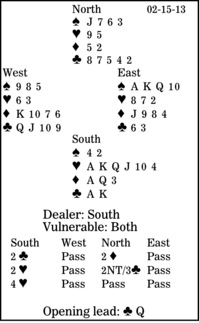Bridge column, February 15: The red-card herring can be misleading

Ann Landers offered the advice that if you want to catch a trout, don't fish in a herring barrel.
The segue from that to this deal is thin. But South is in four hearts. West leads the club queen. How should declarer plan the play? What were West's more effective opening leads?
North's rebid was a double negative, showing a very weak hand, choosing either two no-trump or three clubs, according to partnership preference. Here, South would have done better to sign off in three no-trump.
South starts with four potential losers: two spades and two diamonds. He has only nine winners: six hearts, one diamond and two clubs.
Probably there is an instinct to play a heart to dummy's nine, followed by a diamond to the queen. However, when the finesse loses, if West now returns his remaining trump (or shifts to spades and East leads a trump in time), South's contract is, as the British phrase it, kippered (from the noun "kipper," a smoked herring).
The diamond queen is a red-card herring. After South takes the first trick, he should cash his diamond ace and play another diamond. The defenders can win, cash two spades and shift to a trump, but declarer takes that in his hand, ruffs the diamond queen with dummy's heart nine (getting a seventh trump trick), crosses back to hand with a spade ruff or a club, draws trumps and claims.
The contract can be defeated if West leads a trump, or if he starts with a spade and East switches to a trump at trick two or three. Then, when South concedes a diamond, the defense plays a second trump to deny dummy a ruff.
** ** **
COPYRIGHT: 2013, UNITED FEATURE SYNDICATE
DISTRIBUTED BY UNIVERSAL UCLICK FOR UFS

